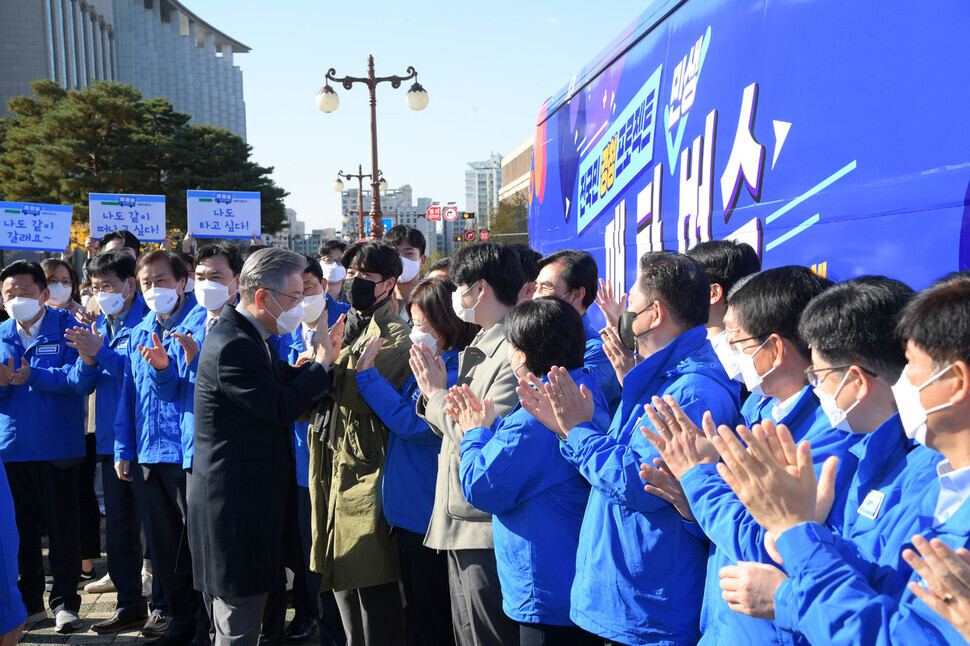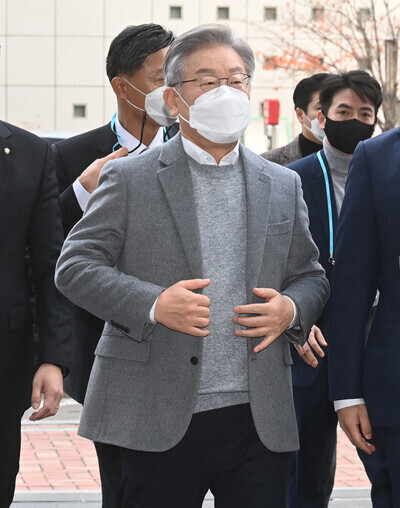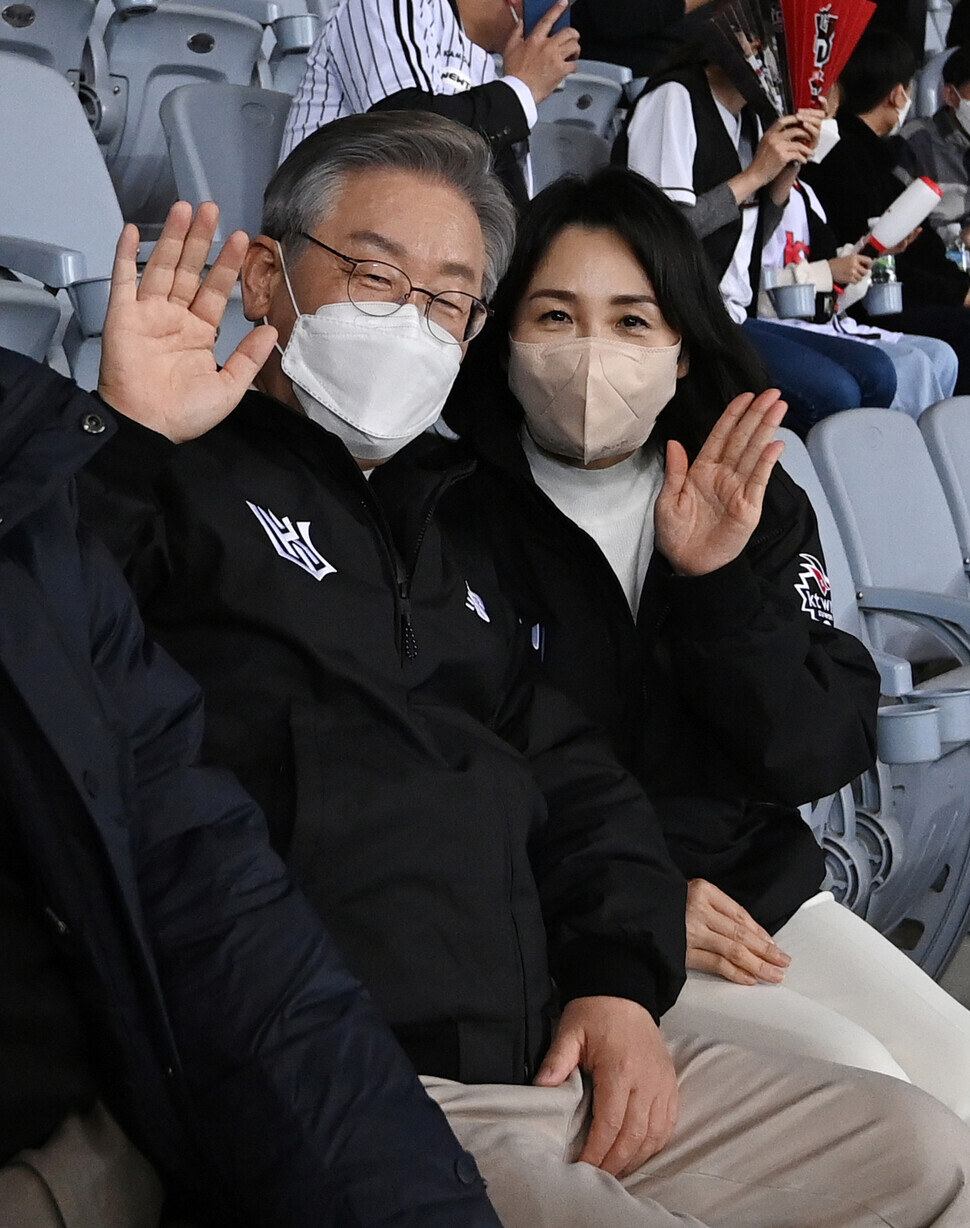hankyoreh
Links to other country sites 다른 나라 사이트 링크
3 reasons Lee Jae-myung and the Democratic Party are losing ground

Are you often in a good mood for no reason these days? Do you find yourself smiling when you leaf through the politics section?
If so, there’s a good chance you identify as a “highly politically engaged” conservative supporter of South Korea’s opposition party.
Have you been down in the dumps lately? Does political news leave you wary about the future of the country? If so, you may be either a highly politically engaged supporter of the ruling party or an independent.
When you live in a democratic country, it’s impossible to remain aloof from politics and elections. An election is a sacred affair, in which we select officials — in Korea’s case, National Assembly members and a president — to entrust with our sovereignty.
But while elections should be a glad occasion, they sometimes leave us unhappy. It can be unbearable to watch “our side” lose. It may feel like some kind of doom awaits us personally — even when that is not the case.

On Oct. 10, the Democratic Party held a convention to select its nominee for next year’s presidential election.
A week earlier, on Oct. 3, Yu Dong-gyu, the former head of the Seongnam Development Corporation’s planning headquarters, was arrested. One of the prospective Democratic candidates, former party leader Lee Nak-yon, delayed his concession for several days due to a dispute over whether nominee Lee Jae-myung had actually secured a majority of votes.
Plagued by controversy over that concession and corruption allegations surrounding the Daejang neighborhood in Seongnam, Lee Jae-myung has seen his support numbers plummet. Normally, the so-called convention effect supplies a boost in support after a nominee is selected; this time, some observers made mention of a “reverse convention effect” for Lee Jae-myung.
The convention to select the People Power Party (PPP) nominee was held on Nov. 5. An opinion poll reflecting popular sentiments showed National Assembly member Hong Joon-pyo winning by a margin of 10 percentage points. But the presidential nomination ended up going to former Prosecutor General Yoon Seok-youl, who led by a large margin in the senior party member vote.
While that convention was underway, numerous findings began to emerge from polls where opposition party supporters were overrepresented. A combination of the convention effect and the bandwagon effect helped to send Yoon’s support skyrocketing.
Lately, the smiles have been wiped off the faces of Lee Jae-myung and Democratic Party lawmakers. Yoon and PPP lawmakers, in contrast, have reportedly been walking on air these days.
Is this how we can expect next year’s presidential election to play out? Unlikely.
National Barometer Survey findings on presidential candidate support that were released on Thursday showed Yoon with 36% of support, followed by Lee with 35%, Ahn Cheol-soo with 5%, and Sim Sang-jung with 4%.
A week earlier, Yoon stood at 39%, followed by Lee with 32% and Ahn and Sim tied with 5%. The gap between Yoon and Lee had shrunk all the way from seven percentage points to one percentage point — putting the matchup within the margin of error.
Gallup Korea findings on presidential candidate support released Friday showed 42% of respondents supporting Yoon, compared with 31% for Lee, 7% for Ahn, and 5% for Sim. Another Gallup Korea poll a month earlier had Lee in the lead with 34%, followed by Yoon with 31%, Ahn with 9%, and Sim with 7%.
Detailed findings from the two polls can be found on the website of the National Election Survey Deliberation Commission.
As these survey examples show, even these rather large polling figures have been seesawing. While we will still need to continue observing opinion trends going forward, it is reasonable to conclude that it is impossible to predict right now who will win next year’s election.
So why are Lee and the Democratic Party lawmakers looking so glum?
It may be that they’re worried they could really lose this election. What’s driving this fear?
There are currents in public opinion that the poll results don’t really capture — things that may seem all the more serious because they aren’t readily visible.

We asked some Democratic Party figures who are closely acquainted with grassroots sentiment about the “real reasons” Lee and the party are losing ground. The answers they gave can be summed up in terms of three problems.
The first had to do with the fundamental limits of the party’s reach.
Many people see the Democratic Party as a mainstream example of vested interests in South Korea today. Yet a look back at the history of past presidential elections shows that not to be the case.
The Democratic Party’s core support base consists of Honam residents and “outsiders” who supported Kim Dae-jung; greater Seoul residents who backed Roh Moo-hyun and Moon Jae-in; and progressive or reformist voters in their 40s in Busan, Ulsan, and South Gyeongsang Province.
But their support alone is not enough to win a nationwide election. The party has always needed to ally itself with others — or to hope for the competing conservative interests to self-destruct.
In 1997, then-National Congress for New Politics candidate Kim Dae-jung formed a regional and philosophical alliance with Kim Jong-pil, leader of the United Liberal Democrats and one of the key figures in the Yushin regime. Meanwhile, Lee In-je split the conservative vote by running a third-party candidate after losing the ruling party’s primary. Even then, Kim Dae-jung won by a measly 1.53 percentage points.
In 2002, Millennium Democratic Party candidate Roh Moo-hyun won by 2.33 percentage points after reaching a coalition deal with National Unity 21 leader Chung Mong-joon. In 2012, Democratic United Party candidate Moon Jae-in narrowed the gap with Park Geun-hye by reaching a deal for Ahn Cheol-soo’s withdrawal. He ended up losing by 3.53 percentage points, but the margin would have been even wider without the deal.
When the Uri Party triumphed in the 2004 general election, when the Democratic Party won the 2016 general election, and when Moon finally won the presidency in 2017, it was because the conservatives did themselves in.
Ultimately, the Democratic Party people’s implicit belief that a 2022 win would be a foregone conclusion was itself unrealistic. That misconception was further fanned by the 2018 local elections, which took place while the North Korea-US summits were underway, and the Democrats’ landslide win in the 21st National Assembly election, which took place amid the COVID-19 crisis in 2020.
At the 2002 World Cup, the South Korean team under coach Guus Hiddink beat world-class competition from Portugal, Italy, and Spain to reach the semifinals. Each match was a miraculous upset.
Was South Korea’s football team really ranked among the world’s top four? Of course not.
The same is true of the Democratic Party’s string of victories around the country since 2016. That means the party’s defeat in the Seoul mayoral by-election on April 7 might represent the party’s true ability.
Second is the softening of the party’s support base. It’s worth recalling that resentment fades over time. The resentment felt by residents of the southwest Honam region over the discrimination they’d faced was partly cleared up by Kim Dae-jung’s election as president in 1997. The resentment over the suicide of former president Roh Moo-hyun in 2009 while his family was being investigated by the authorities was somewhat assuaged by Moon Jae-in’s election as president in 2017, as well as by the imprisonment of former presidents Lee Myung-bak and Park Geun-hye in the Moon administration’s drive to uproot deep-seated problems in South Korean politics and society.
In contrast, the resentment of the conservative establishment and of Lee and Park’s fervent supporters has been mounting higher and higher over the years. How great their desire for revenge must have been to nominate for president the very prosecutor general who sent both Lee and Park to prison during the Moon Jae-in administration!
Does history repeat itself? The 2007 presidential election pitted Lee Myung-bak against Chung Dong-young. Content with ten years in power, voters for the Democratic Party stayed home, depressing the voting turnout to 63.0%, the lowest it had ever been. Lee ended up trouncing Chung by 22.53 points.
That was the true tragedy of Roh’s death in 2009. Though more than a decade has passed, Democratic Party supporters once again seem to be forgetting their history.
Third, there are the mistakes that have been made by the Moon administration. Elections are a procedure not only for appointing power to politicians and parties, but also for holding them accountable. It goes without saying that politicians should face judgment for the mistakes they make.
Moon himself brought that point up in a meeting with senior secretaries and advisors at the Blue House following the Democratic Party’s resounding victory in the local elections in 2018. “The immense support we’ve received is on one level frightening enough to send a chill down one’s spine,” he told his aides, asking them for capability, morality and humility.
Capability collapsed in the failure of real estate policy, and morality imploded with the scandal surrounding former Justice Minister Cho Kuk. When two of the three legs propping up a stool are kicked out from under it, it’s no longer able to serve its purpose.
The three challenges facing Lee Jae-myung and the Democratic Party are too fundamental to be surmounted through political engineering or electoral techniques. That’s why the current crisis is considered so grave.
The wavering regional coalition and generational allianceAt any rate, the fundamental limitations of the Democratic Party, the softening of the support base, and the poor governance of the Moon administration is undermining the regional coalition and generational alliance that the party forged with such difficulty during the Roh and Moon administrations. North and South Chungcheong provinces, Busan, Ulsan, and South Gyeongsang Province are more favorable to Yoon Seok-youl than to Lee Jae-myung. Millennial voters aren’t on board with Lee or his party.
Examining the causes of the crisis faced by Lee and the Democratic Party is quite different from predicting that Yoon Seok-youl and the People Power Party will win next year’s presidential election.
The outcome of the election is decided by passion and fashion at the last moment. Politics is the place where virtu (competency) and fortuna (chance) intersect to produce harmonies of various kinds.
It was impossible to know who would win the presidential elections in 1997, 2002 and 2012 until the day before the election. That was also true of the general elections in 1996, 2000, 2012, 2016 and 2020. Chalk that up to “Dynamic Korea.” Just how will Lee Jae-myung and the Democratic Party find a way to overcome this crisis?
By Seong Han-yong, senior editorial writer
Please direct questions or comments to [english@hani.co.kr]

Editorial・opinion
![[Editorial] Yoon must halt procurement of SM-3 interceptor missiles [Editorial] Yoon must halt procurement of SM-3 interceptor missiles](https://flexible.img.hani.co.kr/flexible/normal/500/300/imgdb/child/2024/0501/17145495551605_1717145495195344.jpg) [Editorial] Yoon must halt procurement of SM-3 interceptor missiles
[Editorial] Yoon must halt procurement of SM-3 interceptor missiles![[Guest essay] Maybe Korea’s rapid population decline is an opportunity, not a crisis [Guest essay] Maybe Korea’s rapid population decline is an opportunity, not a crisis](https://flexible.img.hani.co.kr/flexible/normal/500/300/imgdb/original/2024/0430/9417144634983596.jpg) [Guest essay] Maybe Korea’s rapid population decline is an opportunity, not a crisis
[Guest essay] Maybe Korea’s rapid population decline is an opportunity, not a crisis- [Column] Can Yoon steer diplomacy with Russia, China back on track?
- [Column] Season 2 of special prosecutor probe may be coming to Korea soon
- [Column] Park Geun-hye déjà vu in Yoon Suk-yeol
- [Editorial] New weight of N. Korea’s nuclear threats makes dialogue all the more urgent
- [Guest essay] The real reason Korea’s new right wants to dub Rhee a founding father
- [Column] ‘Choson’: Is it time we start referring to N. Korea in its own terms?
- [Editorial] Japan’s rewriting of history with Korea has gone too far
- [Column] The president’s questionable capacity for dialogue
Most viewed articles
- 1Months and months of overdue wages are pushing migrant workers in Korea into debt
- 2At heart of West’s handwringing over Chinese ‘overcapacity,’ a battle to lead key future industries
- 3[Editorial] Yoon must halt procurement of SM-3 interceptor missiles
- 4Trump asks why US would defend Korea, hints at hiking Seoul’s defense cost burden
- 5Fruitless Yoon-Lee summit inflames partisan tensions in Korea
- 6Dermatology, plastic surgery drove record medical tourism to Korea in 2023
- 71 in 3 S. Korean security experts support nuclear armament, CSIS finds
- 8[Editorial] New weight of N. Korea’s nuclear threats makes dialogue all the more urgent
- 9First meeting between Yoon, Lee in 2 years ends without compromise or agreement
- 10Under conservative chief, Korea’s TRC brands teenage wartime massacre victims as traitors